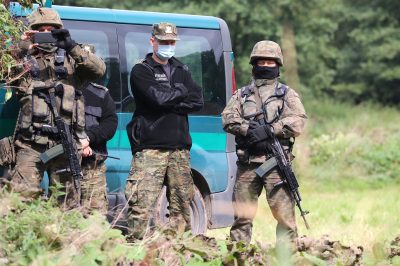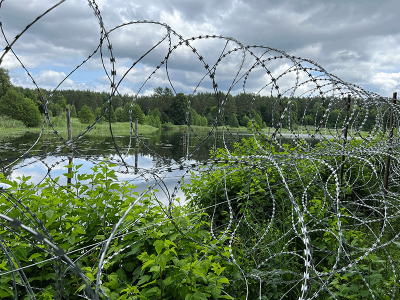
Warsaw, 28 March 2025
Position of the Management Board of the Helsinki Foundation for Human Rights regarding the mechanism of temporary and territorial restriction on the foreigner’s right to apply for international protection in Poland
On 27 March, the Act of 21 February 2025 amending the Act on Granting Protection to Foreigners within the Territory of the Republic of Poland (colloquially, although not entirely correctly, referred to as the asylum act), signed the day before by the President of the Republic of Poland, entered into force, introducing a mechanism for temporary and territorial suspension of the right to apply for international protection into the Polish legal system. Contrary to earlier announcements by the Undersecretary of State in the Ministry of Interior and Administration, who had assured that this mechanism would only be used in an extremely critical situation, on the same day the Council of Ministers issued a regulation introducing the restriction into force. In this laconic implementing act, effective from the date of its announcement, the Council of Ministers specified the time and territorial scope of the aforementioned restriction. Thus, the Government’s announcements, which from the beginning had aroused opposition not only from non-governmental circles, but also from the Ombudsman for Children, the Ombudsman, the Commissioner for Human Rights of the Council of Europe, the Office of the United Nations High Commissioner for Refugees (UNHCR), and at the stage of parliamentary work also from the legislative offices of the Seym and Senate, became a fact. People seeking protection from persecution in their countries of origin, victims of the humanitarian crisis on the Polish-Belarusian border, people experiencing violence at the hands of Belarusian services (and according to many accounts, Polish services as well), overnight lost their last chance for safe shelter and access to the refugee procedure, which for decades had been the quintessence of the universal nature of human rights and of the effectiveness of global mechanisms protecting these rights. The Helsinki Foundation for Human Rights regret to note the fact that it is Poland, a member state of the European Union and the Council of Europe, that is currently contributing to the collapse of the system of international safeguards for the protection of human rights and freedoms.
The Helsinki Foundation for Human Rights, from the first announcements of the Government to the submission of the act for signature by the President of the Republic of Poland, consistently maintained the position that the proposal itself and the provisions specifying it were inconsistent with national law, including the Constitution of the Republic of Poland, EU law and standards of international law. The Foundation perceived the mechanism of restricting the right to apply for international protection not only as inadequate to the actual situation on the Polish-Belarusian border, but as outright detrimental to state security and border protection. By abandoning successive procedures on the border, this time the refugee procedure, the state de facto and de iure gradually deprived itself of instruments for effective migration management, and replaced clear rules of conduct of state bodies, accompanied by appropriate procedures for identifying foreigners, with a chaos of arbitrary and undocumented decisions of individual officers. Such a method of operation of the state and its officers, which amounts to administrative authority deprived of any effective higher-instance or judicial review, is not appropriate for a state that wants to consider itself a democratic state of law. The entry into force of the act and the regulation discredit the government’s narrative of restoring the rule of law in Poland.
The Helsinki Foundation for Human Rights fully upholds its previous position regarding the provisions of the amended Act on Granting Protection to Foreigners on the Territory of the Republic of Poland, and also critically assesses the content of the regulation issued by the Council of Ministers on 27 March 2025 on the temporary restriction on the right to submit an application for international protection.
The statutory provisions introducing the mechanism of temporary and territorial restriction on the right to international protection are inconsistent with the Constitution of the Republic of Poland, including with its Article 56.2, which makes the right to apply for international protection a constitutional right of every foreigner, and Article 31.3, according to which any restrictions on constitutional freedoms and rights may be established only in an act with the rank of an act of parliament and only when they are proportionate and purposeful, i.e. when they are necessary in a democratic state governed by the rule of law to protect such values as security or public order. Such a restriction on the constitutional law, the details of which (duration, territorial scope and de facto also the personal scope) are specified each time by the Council of Ministers in an act of the rank of a regulation, is inconsistent with Article 31.3 of the Constitution.
The adopted provisions are inconsistent with EU law, both that currently in force and that pending entry into force together with the Pact on Asylum and Migration. None of the EU Treaties, none of the directives, including the most important one – Directive 2013/32/EU on common procedures for granting and withdrawing international protection – nor any of the regulations included in the Pact, which will automatically become part of the Polish legal order on the date of entry into force (contrary to the declarations of the Government), provide for the possibility of suspending the right to apply for international protection. Moreover, the currently applicable Directive 2013/32/EU obliges the EU member states to ensure that every foreigner declaring their willingness to apply for international protection in a given country is treated as an applicant in the refugee procedure and is immediately admitted to the appropriate refugee procedure.
Finally, the provisions of the Act are flagrantly inconsistent with international law, especially with the UN Convention on the Status of Refugees (the so-called Geneva Convention), which is binding on Poland. The Convention does not provide for the possibility of a general suspension of the right to apply for international protection and does not allow for the suspension of the principle of non-refoulement, which is fundamental to the international system of human rights protection and which prohibits the return of foreigners to the borders of territories where their life or freedom will be threatened.
The Regulation of the Council of Ministers of 27 March 2025, introducing a restriction on the right to apply for international protection, only raises additional doubts and due to its imprecision and brevity it only increases chaos and deepens the crisis of the rule of law. It is also inconsistent with the provisions of the recently adopted act.
According to § 2.2 of the Regulation, the restriction on the right to apply for international protection applies on the state border with Belarus. The use of the term “state border” by the authors of the Regulation is of significant importance in this respect. The principles of interpretation of legal acts require that this term be referred to the legal definition of the concept of “state border” contained in Article 1 of the Act on the Protection of the State Border (such a reference is indeed included in the Act on Granting Protection to Foreigners on the Territory of the Republic of Poland in Article 2.6). According to this provision, the state border is the vertical surface passing through the border line, separating the territory of the Polish state from the territories of other countries (...). That is, the border is the border line between Poland and neighbouring countries, in this case Belarus, as well as everything above and below it. The border line, which, in addition, runs on the outside of the border barrier, at a distance of at least 1.25 metres from the barrier itself. Therefore, according to § 2.2 of the Regulation, the restriction should apply only on the border line itself. As it seems, there is no legal basis for refusing to accept an application for protection from people who cross this line (who are revealed after crossing the barrier, e.g. a kilometre inland). This was probably not the intention of the creators of the Regulation. It can therefore be expected that the practice of the Border Guard will be different, nevertheless it will be inconsistent with the Act and the Regulation itself.
The use of the term “state border” leaves no doubt that the restriction is also to apply at border crossings with Belarus (i.e. at the operating border crossing in Terespol). This, in turn, seems to be contrary to the content of Article 3 of the Act itself and gives rise to justified allegations that the Council of Ministers, by issuing the Regulation, exceeded its statutory delegation. The material conditions authorising the Council of Ministers to establish a restriction on the right to submit an application for international protection have been specified quite precisely in Article 33(a).1 of the Act on Granting Protection to Foreigners on the Territory of the Republic of Poland. According to this provision, the aforementioned right may be restricted in a situation where: (-) migration is instrumentalised, (-) actions taken as part of this instrumentalisation constitute a serious and real threat to the security of the state or society, and (-) the introduction of a temporary restriction on the right to submit an application for international protection is necessary to eliminate the threat referred to in the previous section, and other measures are not sufficient to eliminate them. In turn, Article 2.6(a) of the Act contains a definition of instrumentalisation. According to this definition, instrumentalisation is the conduct by a state bordering the Republic of Poland or another entity of actions aimed at enabling foreigners to cross the EU external border in violation of the law, in particular by using violence against state service officers and soldiers of the Armed Forces of the Republic of Poland protecting this border or in combination with the destruction of border infrastructure, which may result in the destabilisation of the internal situation on the territory of the Republic of Poland. If, therefore, the instrumentalisation of migration, according to the Act, is to inspire actions aimed at enabling foreigners to cross the EU external border in violation of the law, then the measures to counteract such instrumentalisation should in no way concern persons who attempt to cross this border lawfully, undergoing border checks and attempting to submit an application for international protection during such checks. Such action does not fall within the legal definition of instrumentalization, and therefore the Government has not been authorised by the legislator to interfere with the right of these people to apply for protection.
Therefore, in the assessment of the Helsinki Foundation for Human Rights, the unconstitutional statutory solution was implemented by the Council of Ministers with a very imprecise implementing act, which, moreover, was issued in violation of the statutory delegation. In this situation, there is no doubt that the crisis of the rule of law, which has accompanied the humanitarian crisis on the border since 2021, has significantly deepened.
on behalf of the HFHR Management Board
Maciej Nowicki
President of the Management Board


